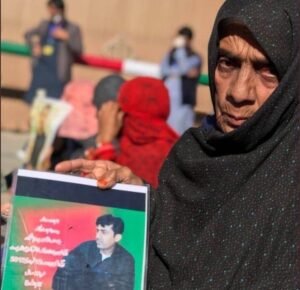Custodial Deaths and Torture: The Grim Reality in Pakistan

@Bing Image Creator
By Fatima Chaudhary
It has been a year since a young Pakistani man died from police torture in the Swat region of the country triggering anger, but several such incidents are reported from across the South Asian nation where atrocities by cops and security agencies has been an accepted norm.
The case of Sanaullah might not have triggered a nationwide protest in the country but his relatives demonstrated against the barbarism which he had to face in police custody eventually causing his death.
In April this year, another custodial death was reported from Karachi area in which one Moiz Naseem had been arrested in an alleged extortion case by the Darakhshan police on the complaint of one Abdul Basit.
According to a media report, instead of registering a case against the suspect, the Darakhshan operational police kept him in their own custody. The suspect died under mysterious circumstances in the lock-up of the police station on the night of April 15, reported The Express Tribune.
Salahuddin Ayubi met a similar fate when he was tortured to death allegedly in police custody a few years ago. Recalling the incident of 2019, Afzal, the father of the victim, told DW: “They brutally murdered my son.”
“I saw the torture marks on my son’s body. His right arm was burnt, either with hot water or electric shocks. There were bruises on his entire body,” Afzaal said, highlighting the treatment meted out to his son who was arrested on charges of breaking into a bank’s ATM counter.
In Pakistan’s Balochistan, extrajudicial killings and enforced disappearances are rampant. Take the case of 20-year-old Balaach, who was abducted from his home in Turbat on the night of October 29 last year by suspected officials from the security agencies.
According to Al Jazeera, the family filed a missing complaint with the police but did not hear for nearly a month despite protests on the street. He was eventually presented in a court in Turbat on Nov 21, only to be killed in custody two days later.
The provincial Counter Terrorist Department (CTD) claimed Balaach was killed in a crossfire while trying to apprehend other terrorists with the information he had provided.
Highlighting these incidents remains crucial on June 26 when the world observes International Day in Support of Victims of Torture.
On 12 December 1997, by resolution 52/149, the UN General Assembly proclaimed 26 June the United Nations International Day in Support of Victims of Torture, with a view to ensuring total eradication of torture and the effective functioning of the Convention against Torture and Other Cruel, Inhuman or Degrading Treatment or Punishment.
UN Secretary General Antonio Guterres perfectly sums up the day when he said: “Torturers must never be allowed to get away with their crimes, and systems that enable torture should be dismantled or transformed.”
However, all these observations remain a mockery when one looks into the incidents repeatedly reported from Pakistan.
According to an Editorial piece published on June 26 in Dawn News, one of the leading newspapers of Pakistan: “This shameful practice is rampant as a means to coerce, terrorise, and dehumanise people, stripping them of their dignity.”
Even though Pakistan’s Torture and Custodial Death (Prevention and Punishment) Act, 2022, provides a comprehensive definition of torture as “an act committed by which severe physical pain or physical suffering, is intentionally inflicted on a person for such purposes as obtaining from him or a third person information or a confession, punishing him for an act he or a third person has committed or is suspected of having committed, or intimidating or coercing him…”, it does not mention mental torture, the newspaper editorial mentioned.
Trying to find a solution to the situation, the editorial asked the “Pakistani government if it was possible to form a committee that would monitor the activities of the officers in police stations.
“Reforms in the police and intelligence apparatus through transparent probes into allegations of ill-treatment and incidents of custodial deaths are mandatory,” the Editorial titled ‘Crime of Torture’ said.
Holding the dignity of citizens as supreme, the newspaper pointed out that upgraded legislation, aided by trained and sensitised officers, the authorities and judiciary will not allow the police and security agencies to escape investigation and accountability.
Rabiya Javeri Agha, chairperson of the National Commission for Human Rights, echoed a similar opinion when she wrote in Dawn News: “All personnel involved in the arrest, interrogation and detention of persons should receive training on human rights and, in particular, on the absolute prohibition of torture.”
Experts have also highlighted the need to educate people about their rights and encourage them to report torture.
Human Rights Watch has long documented the widespread use of torture and other ill-treatment by the Pakistani police during criminal investigations.
In its report, the organisation claimed methods of torture include beatings with batons and littars (leather straps), stretching and crushing legs with roola (metal rods), sexual violence, prolonged sleep deprivation, and causing severe mental anguish, including by forcing detainees to watch other people being tortured.
In a report published by the US State Department, it has been mentioned that there were reports that police personnel employed cruel and degrading treatment and punishment.
“Police abuse was often underreported. Impunity was a significant problem in the security forces due to politicization, corruption, and a lack of effective mechanisms to report and investigate abuses,” the report said.
June 26 should now be considered as a date when Pakistan’s new government should pledge to end this menace from society and ensure people live with dignity and prestige.
The country should also ensure that those involved in torturing citizens should not walk free and are punished as per law.
Without such a measure being taken, the barrier of impunity around torture will never be broken.
Fatima Chaudhary is a lecturer at a private university in Punjab province.
Note: The contents of the article are of sole responsibility of the author. Afghan Diaspora Network will not be responsible for any inaccurate or incorrect statement in the articles.











